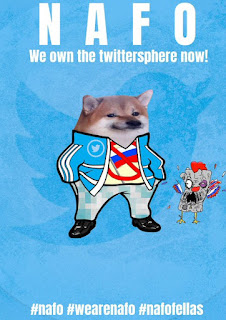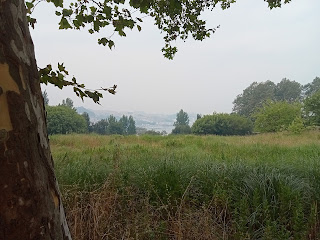“It would probably not be beyond human ingenuity to write books by machinery.” George Orwell
AI Prompt: write a pop song using Schönberg’s 12-note scale celebrating a time-traveler's deletion of that bastard Brahms from this timeline:
The question of what art is: Joseph Beuys: “The thing that was missing was that all these fundamental questions, that is, the fundamental research into art and its function, could not be answered at the Academy,” or by Artificial Intelligence.
AI language games are directed towards/focused on answering inane questions, not fundamental questions; its baby-paws grasp after graffiti equivalence, DPRK candy realism, the desperate urge to it-looks-like representation – count each hair on that cat - O and/or plastic abstract neatness. New car shiny. As with every new technology from oil paint to Augmented Reality, the Paradigm: artists and pornographers take up the challenge to push it beyond its material limits to explore or predict the technology ('tis a consummation devoutly to be wished by Capital juggling “a world defined by new and complex regimes of differentiation and homogenization, deterritorialization and reterritorialization” – Negri+Hardt). AI’s Eternal September to ‘create’ is ‘exponential’, they say, the adjective triggers fear in some/fearsome – FEAR a system requirement – fictively we anticipate Cyberdyne Technologies, Elysium, or Brain Salad Surgery “I’m perfect. Are you?”: all AI literature descends to an end-digit, redundancy, extinction.
True or manufactured, manufactured or true, the media reports two responses from the ‘cultural’ sector: the early adopters embrace it, and the luddites design a ‘Human Artistry’ campaign kitemark. This is no more than a repetition, repetition, an evolutionary categorisation of late capitalism, consumption, surplus value increased with the artificial means of production in the hands of the few, ‘all-human’ production having as much relevance to this model as Sunday painters have to the Venice Biennale.
AI Prompt: Create a concrete porn-poem featuring a Monkey Christ and two cats
As with every new artistic tool, the quality of work produced has a direct relationship to the talent or vision of the human experimenting with it. There’s always a Leonardo who paints the Last Supper in oil on plaster, so it takes centuries of restorers to stop it flaking off the wall. We sit in that refectory as intended.
AI Prompt: Create a 1980’s playlist for DJ Dostoevsky
Ironically the Leonardo’s are the most dangerous to the capitalist paradigm. Bertran de Born and the pop song writers who whinge about how ‘terrifying’ it is that pop could be completely appropriated by AI need to listen to themselves, that boat sailed some time ago. I am reminded of an interview I heard on Radio 1 in the 1980’s with Martin Fry, lead singer of the band ABC, in which he opined that if Dostoevsky was alive in the 80’s he would be DJing in Covent Garden. I remember laughing out loud and like to think that I spat out my coffee. (I wonder whether anyone else remembers that statement? Roy Batty: ‘I've seen things you people wouldn't believe... Attack ships on fire off the shoulder of Orion... I watched C-beams glitter in the dark near the Tannhäuser Gate. All those moments will be lost in time, like tears in rain… at the end of that tea ceremony in Taipei).
AI Prompt: Design a sampler font which represents Saul Bellow’s description of seeing Trotsky’s corpse in the Mexican hospital in 1940.
Dostoyevsky: “I am a sick man... I am a spiteful man. I am an unattractive man. I believe my liver is diseased. However, I know nothing at all about my disease, and do not know for certain what ails me.” Bellow: “If I am out of my mind, it’s all right with me, thought Moses Herzog” – "the periphery still reproduces itself as the periphery.” This was my mistake. I tried to make the peripheral central: it was contraindicated all along.
Ai is the revenge of a kindergarten intellect upon art… violate art - based on the highly dubious theory that a work of art is composed of items of content. “It makes art into an article for use, for arrangement into a mental scheme of categories,” observes Susan Sontag. The Handbook of Inaesthetics notes “[a work of art] sets itself up as an inquiry into the question of its own finality. It is the persuasive procedure of its own finitude. This is, after all, why the artwork is irreplaceable in all of its points (another trait that distinguishes it from the generic infinite of the true): Once ‘left’ to its own immanent ends, it is as it will forever be.” Sylvain Lazarus asks whether there may “exist a regime of the thinkable that is inaccessible to this total jurisdiction of language.” The answer is obviously YES. I count five just in this post.
A truth is something we make. It is declared, composed, and upheld by the subjects it convokes and sustains. “Our world is full of copiers and repeaters, ... It is better to interpret than to compose; it is better to have an opinion on a decision that has already been made than to make one’s own. The modern illness is the engulfing of the new in the duplicata, the engulfing of intelligence in the pleasure of the homogeneous” (Michel Serres) but it’s hard. “No bird has the heart to sing in a thicket of questions,” says René Char.
AI Prompt: Choreograph a pustulant pavane for James Daly MP in the style of Charlemagne Palestine’s Schlongo!!
To show willin’: I gave AI a couple of chances while writing this: its DJ Dostoevsky generated nothing more than a 80s playlist and its Pavane was literally a description of dancers imitating spots bursting which scraped to the technical level infant school play. AI embarrassed itself. To anyone saying 'ah, but maybe AI is still at the level of a child.' I say child art is of no interest to anyone except to the parents.
AI Prompt: what would it mean if
Christian Bök has claimed poetry in the future will be written by machines for other machines to read – but like humans, the poetry machines won’t be paid for their works and the poetry reading machines will be a tiny group that turn up to performances on a wet Tuesday night in a room over a pub. In the words of the Irish gangster – “who fucking cares?”
Or as Tom Raworth wrote:
Lion Lion
the happy hunters are coming back
eager to be captured, to have someone unravel the knot
but nobody can understand the writing
in the book they found in the lion’s lair.


















